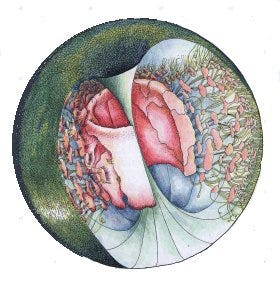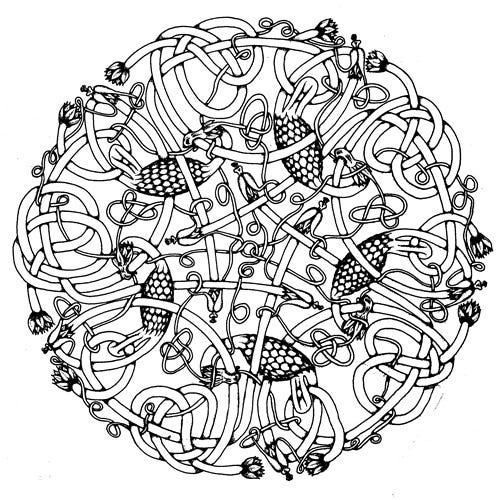Here's a thing. A decade or so ago while thinking about my meta-pata-fiction Konsk, I decided that the character Harold Trueman, who embodies a sort of narcissistic, dogmatic scientific attitude, needed a grand theory of everything that was his alone and was going to be his great claim to fame. Looking for a model I pondered on Albert Einstein and his theories of special and general relativity and how he had revolutionised science by thinking outside the box.
Put simply, before Einstein, time and space were considered to be unchanging constants, meaning no matter how fast an object might be moving, clocks anywhere in the universe would remain synchronised and rulers would all stay the same length. On the other hand, the speed of light, was thought to vary, depending on how fast the source of light was moving. So light coming out of a spotlight on the front of a moving express train would move at the speed of light plus the speed of the express train.
This all seemed very straightforward and was accepted without question, until Einstein had the courage to imagine something different, that time and space might vary according to the speed at which an object was travelling and that the speed of light was in fact a constant, no matter how fast the light source might be moving. Einstein was able to present all this in his theories of relativity and then used the theories to make several predictions which were subsequently proved to be correct.
So, back to Harold Trueman, self-proclaimed scientific genius; could he come up with a major new theory that would similarly revolutionise our understanding of the universe? I started by thinking about the way Einstein had simply (ha!) reversed the conventional thinking on time, space and the speed of light and wondered if our Harold could do something similar.
Conventional scientific thinking (materialism or physicalism) assumes that the universe begins as energy and as the energy expands and cools we get matter, basically electrons and quarks that combined to form protons and neutrons and then the simplest atom, hydrogen (a proton and one electron). These atoms clumped to form stars which fuse hydrogen, releasing vast amounts of energy and incidentally creating more complex atoms.
Old stars explode in supernovae, spreading the more complex matter through the universe. Repeat the star formation and explosions, add in planets made up of mixes of atoms and combinations of atoms (molecules), then the increasing complexity of molecules, including eventually self-replicating molecules and at some point cellular life appears. From single cells we eventually get to multicellular creatures, moving from the simple to the more complex, plants, animals, us and somewhere along that line, minds and consciousness emerge.
So basically materialists have energy, matter, life and mind, in that order. Again, sounds very sensible and rational but there are some major difficulties in this approach. Firstly, how does mind emerge from no-mind? Are we to suppose that one generation of life does not have mind and then the subsequent generation suddenly does? This seems a bit miraculous and if we are to allow miracles, then anything is possible.
Similarly, we then have to decide what type of life has a mind and what life does not. Again, we have to draw a line somewhere which is problematic.
Trueman's idea was to reverse this thinking so rather than energy to matter to life to mind, he argued that we begin with mind then move to energy, matter and life. Hence everything is in some way en-minded. this seemed to be a suitable candidate for Harold Trueman's rather mad Great Theory of Everything.
Fast forward several years and and I'm washing up while listening to an episode of In Our Time, Melvyn Bragg's excellent series on Radio 41 and this one is about something called Panpsychism2. Within ten minutes I realise that not only is Trueman's Postulate nothing new at all but it is both extremely ancient and entirely relevant and arguably essential today.
Very basically, panpsychism suggests that some form of mind/awareness/mentation/psyche exists at all levels of the universe, from the very large down to the very small, including elementary particles.
Having thought more deeply about it since Melvyn's programme and read several books on the subject I was prepared to kick myself! I followed a joint honours course at university3 and one of my subjects was Classical Studies which included excellent modules on the History of Ideas, Greek for one year, Roman for the second. Thinking back on these courses I recalled that almost all of the major philosophies of this period (in fact all philosophies and metaphysics up to about 1700CE) were basically panpsychist or had panpsychist elements. The terms used varied and included everything being of made fire, or having breath, psyche, mind, spirit or soul but the principle was the same, all matter was somehow alive and sentient. This was so conventional and accepted that it was considered hardly worth mentioning by some philosophers.
Panpsychism is also strongly rooted in the traditions of most indigenous people but its not the same as animism, whereby objects like rocks or pools in a river are considered to have animating spirits which have attributes like human beings; it is rather that all matter has some sort of capacity to experience and respond to its surroundings.
The big change came with people like Galileo4 and Descartes who separated mind and matter and decided that only human beings had souls and since then the whole concept of soul has been largely removed from scientific thought.
The conventional thinking we have today arises from this approach and considers that mind is simply (ha!) the result of deterministic interactions at a quantum level which produce progressively larger interactions of things like neurotransmitters and the electrical firing of neurones in brains that (somehow) produce an individual consciousness. Listen to someone like Brian Cox on Radio Four's The Infinite Monkey Cage an you'd think it was all sorted! But it ain't...
The materialistic approach is what has allowed us to develop the sort of complex technologies like space travel, solar panels, mobile phones, new materials etc. etc. and all the other advances (...) of the modern world. The downside of this is that taking the soul out of the world and all its many beings and non-beings has made it much easier for us to freely dominate, exploit, pollute and progressively degrade the Earth in pursuit of our own selfish aims.
As David Skrbina says in his excellent book, Panpsychism in the West5,
...our mechanistic worldview is in error: .... by treating nature as mindless, we engage in irrational and destructive behavior. Metaphysics has consequences...The mechanistic worldview once liberated humanity from religious dogma. Now it appears to have outlived its usefulness. It has become its own dogma, more stifling and destructive than the one it usurped.
There is currently a resurgence of panpsychism as it largely avoids the need for the miraculous emergence of mind and the difficulty of having to draw a line for which forms of life have minds. Also, the very idea that all matter and the universe itself may have some sort of mental quality is very powerful; it is an idea that was taken up not just by Deep Ecologists but by many philosophers and scientific thinkers, including people like the British astronomer Arthur Eddington, the philosopher Bertram Russell, Teilhard de Chardin, the early ecologist Gregory Bateson and physicist David Bohm and more lately by folk like Philip Goff and Joanna Leidenhag6 who feature on the Melvyn Bragg In Our Time episode, to name just a few.
Not surprisingly there is considerable resistance from materialists – after all, no one wants to abandon long held beliefs but the amount of scorn and derision piled on to panpsychism and the reluctance by some to even consider it as a serious proposition suggests that there is something deeper going on here.
Yet as David Skrbina says,
Objectivity, moral neutrality, and a fundamentally inanimate nature are mechanistic assumptions about the world—presumed but never proven. [My italics]
And towards the end of the book he concludes,
These beliefs of Empedocles, Fechner, James, Bateson, and others are striking; they suggest that panpsychism is the superior worldview because it leads to a more integrated, compassionate, and sympathetic cosmos. It is life-affirming and life-enhancing.
Which is exactly what is needed today if we are to halt this dreadful destruction of our Earth and all its beings and non-beings.
An afterthought.
In my look at panpsychism I came across several references to atoms as social organisations but no further details, so here's my take on it.
If we think about an atom, take a simple one (the simplest), hydrogen. A hydrogen atom is made up of one electron (an elementary particle) and one proton with the proton in turn made up of three different quarks (elementary particles). If we think of these particles, they all maintain stable relationships with each other, mediating (communicating) those relationships and positions by the exchange of other fundamental particles, namely w and z bosons and gravitons. They can thus be seen as a social, cooperative group.
If we then accept that according to quantum theory, all these particles also have a wave function, that the hydrogen atom exists as a superposition of interacting fields, embedded in a universe of similar fields, then that interactive, cooperative nature seems to be the ground for everything in the universe.
Various scientists have suggested that the wave function could be related to consciousness. Stuart Hammeroff and Roger Penrose for example, argue that quantum stable states occur within the microtubule network in the human brain and that the collapse of the wave function is a moment of conscious experience. See
Roger Penrose. The Emperor's New Mind: Concerning Computers, Minds and The Laws of Physics. 1989. Oxford Landmark Science.
A fascinating read and a direct challenge to the mechanistic model of mind.
Thanks for reading. Comments welcome. All illustrations are by me.
I can't over emphasise what a brilliant resource this series is. Each episode deals with a different topic and Melvyn has three experts on and uses his inimitable style of questioning to draw out and explain the subject. There must be some preparation before hand but the actual broadcast is live and so can go off in unpredictable directions. You can often hear the growing excitement in the contributors and Melvyn's voices as they tease out some little recognised gem or between them produce a really good explanation of a complex subject. There are over 1000 episodes now available to listen to using the free BBC app Sounds, ranging from quantum chromodynamics through to Jane Austen, covering politics, science, literature, architecture, history, prehistory and much more.
The episode is availble to listen to or download here.
Melvyn’s guest contributors are Philip Goff of Durham University, Joanna Leidenhag of the University of Leeds and Tim Crane of the Central European University. Interestingly Melvyn has two pro-panpsychists (Goff and Leidenhag) and one anti-, Tim Crane, so there is the opportunity for argument and debate. I love listening to philosophers argue- they have to be so reasoned and calm about it, even when they're spitting teeth!
Joint Honours or being an Honours student sounds very posh and high faluting but all it means is that you study two subjects at degree level rather than just one. Some folks would argue that this means you study two subjects less thoroughly than a single subject so it's an easier route. I took Drama and Classical Studies at Aberystwyth and coming from a Yorkshire village with a library the size of a front room, the comparatively vast Hugh Owen Library became my second home while there. Moving between the Drama section in the library and the Classical Studies section I found Psychology in the middle, an interesting coincidence as that subject is very relevant to both the others. I gradually read my way through much of the psychology section, which became my virtual third degree.
1564-1642. Galileo in effect discarded the qualities of matter (such as the colour and flavour of an orange) in favour of measurable properties like mass, shape, speed. This repression allowed science to make enormous progress. Philip Goff's excellent and accessible book Galileo's Error shows how this means the scientific interpretation of the universe is only partial and that a panpsychist approach offers a way to a fuller understanding.
David Skrbina. Panpsychism in the West, revised edition, MIT. 2017
I found this book really useful, very readable and interesting. David provides the first, modern appraisal of panpsychism, looking back for evidence of panpsychism in the works of the earliest recorded philosophers through to the present day. In doing so he also provides a useful account of the development of philosophy. His final chapters look at the challenges faced by materialism, dualism and panpsychism. He comes down strongly on the side of panpsychism. Well worth getting from your library.
Incidentally, Joanna is a Theist (believes in a god) and suggests that panpsychism provides a belief system which is compatible both with modern science and with religious convictions of deity.






